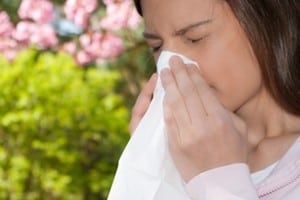
Pollen allergy sufferers may have even more to fear from global warming than previously thought, according to a new study conducted at the University of Massachusetts Amherst. Although it may not seem like as big of a threat as the natural disasters and epidemics that climate change is already beginning to cause, the increased atmospheric grass pollen level predicted by the study will cause significant suffering for those with pollen allergies, leading to more allergy-related serious illnesses and deaths in the future.
According to the study, conducted by Christine Rogers and a team of researchers from the UMass School of Public Health and Health Sciences (SPHHS), grass pollen allergen exposure could increase by up to 202 percent in the coming century. The researchers studied the effects of increased carbon dioxide and ozone levels on Timothy grass, one of the most common pollen-producing grasses. The grasses were isolated in chambers and exposed to various levels of both ozone and carbon dioxide gases.
The researchers predicted that although carbon dioxide speeds plant growth and elevates pollen production, the accompanying high ozone level would stunt the plants' growth. In fact, this did not happen, with ozone barely affecting the CO2-fueled increase in pollen production. The 202 percent increase figure is based on a carbon dioxide level of 800 parts per million, which is still a ways off from current levels, but even half that increase could still lead to substantial allergen increases as well.
According to Rogers, "Grasses are widely abundant in all biomes and grass pollen allergy is highly prevalent worldwide," with about 20 percent of people suffering from pollen allergies. Therefore, the study has worldwide implications and should serve as a warning to keep CO2 from accumulating at dangerous levels.
If you have pollen allergies, now is the time to act. Purchasing an air purifier for allergies is the best way to make sure you're breathing clean air for at least part of the day.